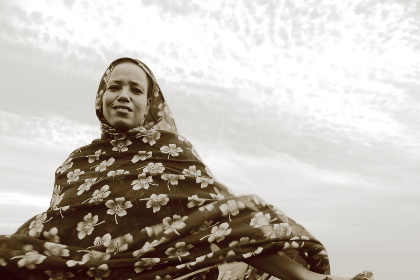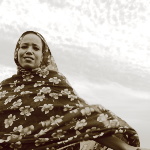- country:Western Sahara
- label:Glitterbeat Records
- artist posted by:Balaio Producciones
Links
Voiced with deep passion and grace, Aziza Brahim’s music adeptly travels the expanse between her Western Saharan roots and Barcelona, the European cosmopolis where she now lives. Aziza is both a contemporary sonic poet and a prominent and eloquent spokesperson for the Saharawi people and their ongoing struggle for recognition and justice.
Born and raised in the Saharawi refugee camps lining the frontier between Algeria and Western Sahara, Aziza’s life has been marked by both daunting hardship and inspired will. Fleeing from these camps and the regime of political oppression that followed Morocco’s 1975 invasion of Western Sahara, as a young teenager Aziza travelled to Cuba for her secondary school studies. There she experienced first hand the deep Cuban economic crisis of the 1990s and the subsequent denial of her request to pursue a university degree in music.
Music had been Aziza’s passion since she was a small girl and despite this setback she returned to the Saharawi camps in Algeria and began singing and playing in different musical ensembles, a process that continued when she moved to Spain in the year 2000. There she founded the eclectic Saharawi/Spanish band Gulili Mankoo with whom she released two acclaimed self-produced recordings: the EP Mi Canto (2008) and an album Mabruk (2012), both on Reaktion, a French label specializing in Saharan music. In the last years Aziza has performed extensively appearing at major festivals and venues including the Queen Elizabeth Hall in London (2009).
Aziza’s album Soutak (“Your Voice”), her debut for the Glitterbeat label, is her first recording to predominantly focus on the cadence of her majestic voice and the soulful critique of her lyrics. The album was produced by Chris Eckman (Tamikrest, Ben Zabo, Dirtmusic) and was recorded live and direct in Barcelona in June of 2013.
Aziza’s next album Abbar el Hamada (“Across the Hamada”) recorded in Barcelona in the summer of 2015 with Soutak producer Chris Eckman is a wholly persuasive example of Brahim’s pan-musical vision.
The music Aziza Brahim makes reflects both the sorrow and the hope of these people. She grew up in one of those camps in the Algerian desert, alongwith thousands of other Saharawi who were removed from their homes in theWestern Sahara. The refugee camp was the place that formed her. It lives in her every heartbeat.
She lives in exile, in Spain, and the music for Sahari (“The deserts”) her fifth album –her third for Glitterbeat -was written and recorded there on 2019. And while her songs remain grounded in her homeland, her gaze is increasingly global. To achieve that, Brahim worked with the acclaimed Spanish artist Amparo Sánchez of the band Amparanoia on the album’s pre-production, and the collaboration has made a transformative impact on the music. The focus is broader, with programming and keyboards a vital part of the new sound.
Sahari mixes North and South sounds on a briliant blend of traditional and modern World Music and has been on the top of World Music Charts Europe (WMCE) on December 2019 and January 2020.



